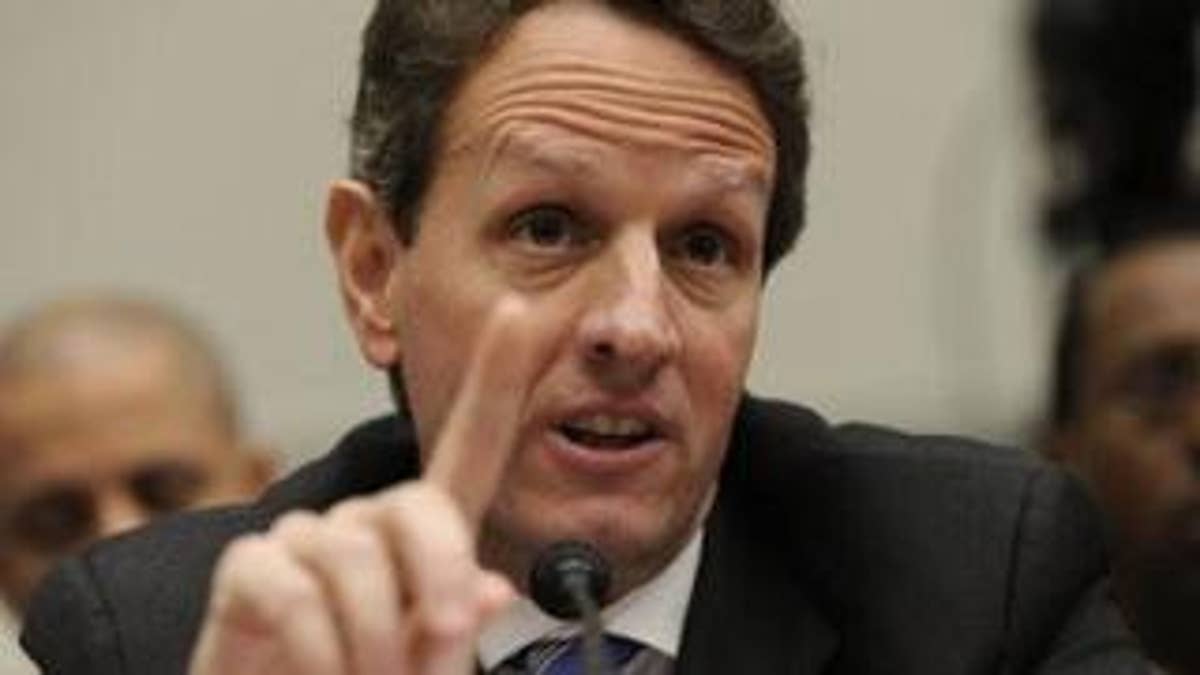
Treasury Secretary Timothy Geithner asked Congress Tuesday to give the White House unprecedented powers to seize large insurers, investment firms and hedge funds, leaping beyond its present authority to seize only banks.
Geithner argued for such authority during the House Financial Services Committee's hearing on the handling of bonuses paid to executives at American International Group.
"As we have seen with AIG, distress at large, interconnected, non-depository financial institutions can pose systematic risks just as distress at banks can. The administration proposes legislation to give the U.S. government the same basic set of tools for addressing financial distress at non-banks as it has in the bank context," Geithner told the committee.
"The proposed resolution authority would allow the government to provide financial assistance to make loans to an institution, purchase its obligations or assets, assume or guarantee its liabilities and purchase an equity interest," he said.
President Obama said later Tuesday that he hopes "it doesn't take too long to convince Congress" that it should approve the new powers.
But Republican leaders were quick to express skepticism Tuesday at the prospect of expanding Geithner's authority.
"I'm a little concerned," House Minority Leader John Boehner told reporters during a press conference. "This is an unprecedented grab of power and before that occurs, there ought to be a real debate about whether we should give that authority to the Treasury secretary."
House Democratic leaders also showed reservation over supporting the administration's call for expanded authority.
House Majority Leader Steny Hoyer told reporters Tuesday: "I want to discuss it with a number of people. Obviously one of the issues that Congress is concerned about is the delegation of authority. We are talking about huge sums of money -- huge consequences for one individual."
"At this point in time, I want to look at it more carefully," he added.
Geithner called on Congress to grant him new powers to regulate huge financial companies like insurance giant AIG, whose failure would pose a grave danger to the U.S. financial system and the broader economy.
Specifically, the Treasury secretary asked for powers similar to those of the Federal Deposit Insurance Corporation, which has authority to seize control of banks, take over their bad assets and sell good ones to competitors.
"AIG highlights broad failures of our financial system," Geithner told the House Financial Services Committee. "We must ensure that our country never faces this situation again."
Federal Reserve Chairman Ben Bernanke, appearing with Geithner, agreed. He said the government's bailout of AIG underscores the urgent need to wind down financial giants on the verge of collapse and subject them to much stronger regulatory oversight.
Much of the discussion centered on ways to help the government better deal with future AIG-like companies whose failure could devastate the financial system and the drag down the economy.
Geithner made it clear he believes the treasury secretary should be granted unprecedented power, after consultation with Federal Reserve Board officials, to take control of a major financial institution and run it. The treasury chief is an official of the administration, unlike the FDIC, which is an independent regulatory agency.
Bernanke and Geithner were braced for a scolding before lawmakers over the handling of bonuses at AIG, which has become a symbol of reckless risk-taking on Wall Street.
For his part, the Fed chief said he wanted to sue to stop insurance giant AIG from paying millions in bonuses, but lawyers advised against doing so.
AIG is a globally interconnected colossus, with 74 million customers worldwide and operations in more than 130 countries. The government decided it was simply too big to let fail.
"Its failure could have resulted in a 1930s-style global financial and economic meltdown, with catastrophic implications for production, income and jobs," Bernanke told the panel.
As a result, the government has bailed out AIG four times, to the tune of more than $180 billion altogether. The company recently paid at least $165 million in bonuses to employees who worked in the financial products division that has been blamed for the its near-collapse. The bonuses came even as AIG reported a stunning $62 billion loss, the biggest in U.S. corporate history.
New York Attorney General Andrew Cuomo said Monday that 15 employees who received some of the largest bonuses from AIG have agreed to return them in full, totaling about $50 million.
Bernanke said it was "highly inappropriate to pay substantial bonuses" to the employees. He said he asked that the payments be stopped but was told that they were mandated by contracts agreed to before the government seized control of AIG on Sept. 16.
"I then asked that suit be filed to prevent the payments," he said. Bernanke said that his legal staff counseled against this action on the grounds that Connecticut law provided for substantial punitive damages in the event any such suit failed. AIG's financial products division has a base in Connecticut.
FOX News' Mosheh Oinounou and The Associated Press contributed to this report.




